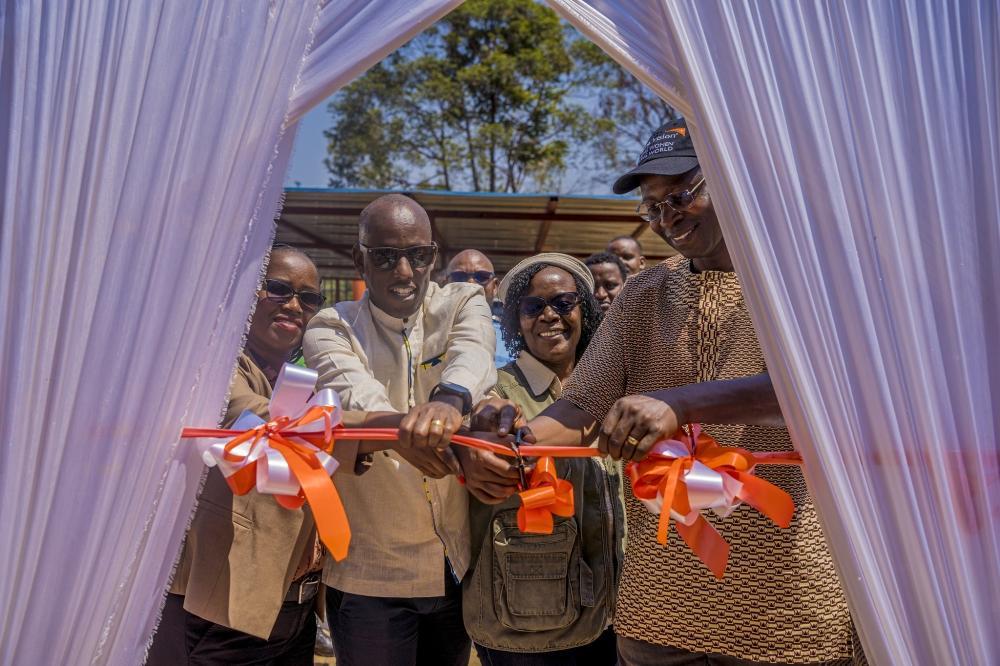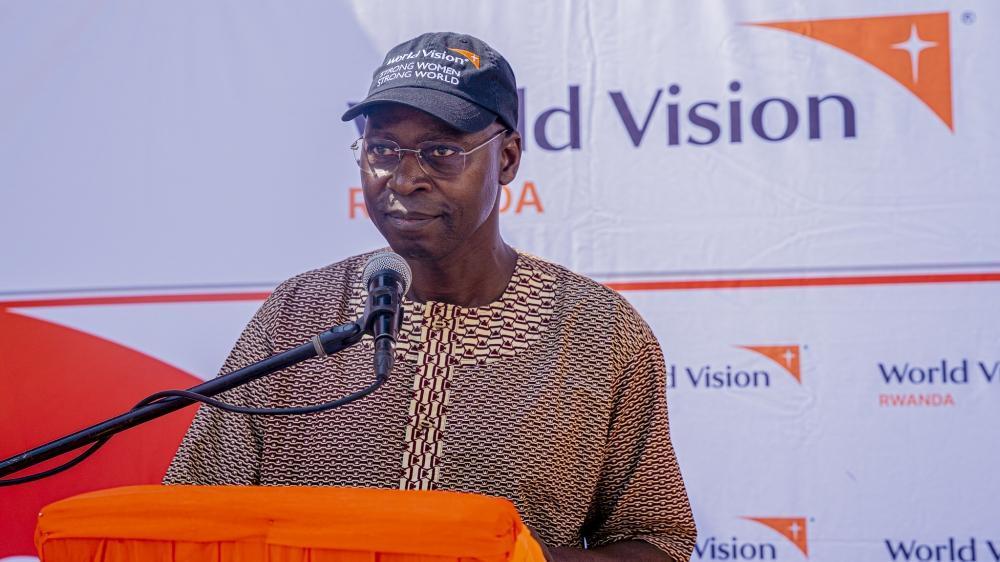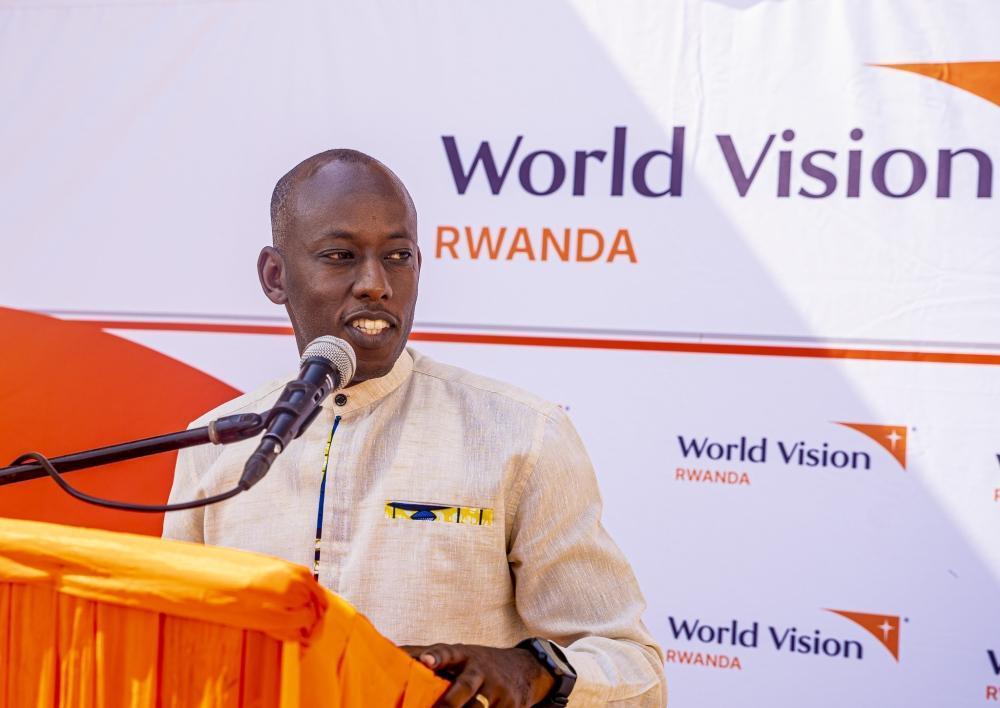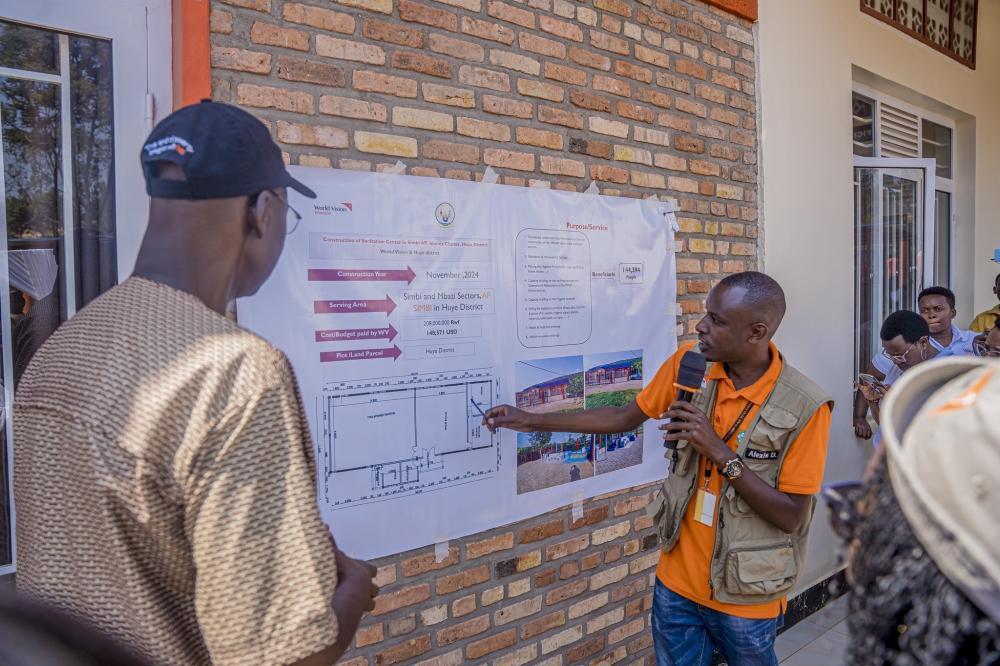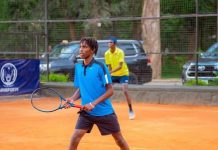Africa-Press – Rwanda. World Vision Rwanda, in partnership with Vision Fund International, the Ministry of Infrastructure, the WASAC Group, REDEC Ltd, and Huye District, has officially launched a pioneering WASH (Water, Sanitation, and Hygiene) financing initiative aimed at accelerating access to safely managed water services in Huye District.
The pilot project aims to connect at least 1,400 households in Mbazi, Kigoma, Simbi, and Maraba sectors to piped water systems in their premises, thereby bringing essential services closer to the communities This project model will contribute to SDG 6 on increasing access to safely managed water services and to National strategy for transformation (NST2), which aims to increase access to safely managed water services from 18% to 50% by 2029, and builds on Rwanda’s National Water and Sanitation Policy and the Sustainable WASH Financing Strategy.
Jean Baptiste Kamate, the World Vision global Chief Field Operations Officer delivers his remarks at the launch of the project in Nyanza District. Photos by Kellya KEZA
It introduces an innovative financing model in which World Vision provides a loan guarantee to community households through Vision Fund Rwanda to enable REDEC ltd to connect the households with clean water.
REDEC Ltd, a water private operator was contracted by Huye district to manage the water supply systems, while Vision Fund Rwanda provides the loan.This financial support enables REDEC Ltd to cover upfront water connection costs for eligible households.
Under this model, households will repay the connection fees as a monthly installment bundled with their water bill, over a maximum period of three years.
The entire loan process is managed through the Customer Management System for Rural Water Supply (CMS-RWSS), recently upgraded by WASAC Group with support from World Vision to include a loan management feature.
Speaking at the launch, Jean Baptiste Kamate, the World Vision global Chief Field Operations Officer, emphasized the importance of sustainable financing solutions in bridging the gap between national goals and on-the-ground realities.
He further emphasised the need for bold innovation to finance this vision.
“That is why we are here, along with other partners, to officially launch the WASH Financing Pilot Project, an innovative, scalable solution designed to connect households to water right at their doorstep. This is a milestone for World Vision and all our partners involved in this project. It’s about transforming how rural communities access essential services like water, with dignity, ownership, and financial empowerment.”
Kamate also commended the government of Rwanda for providing an enabling environment, saying World Vision can make visible progress when national leadership is aligned with community needs.
“World Vision thrives where governments are visionary. In Rwanda, we are empowered to align with national priorities. That’s why progress is visible. I oversee over 80 countries, but Rwanda has one of the best models and serves as a great example that drives development through collaboration. We are also so proud of what we have achieved together in the past, with the government of Rwanda through co-financing to provide access to water to more than One million people,” he added.
He emphasised that clean water access at home improves health, education, safety, and economic potential, whilst restoring dignity and creating long-term opportunities for communities.
“Clean water at home means dignity, health, time, safety, and opportunity for communities. Water changes everything, not for one person but for the whole society, so learning about hygiene is important for all,” he said.
The Mayor of Huye District, Ange Sebutege, highlighted that the ongoing collaboration between World Vision and the district is important, especially through impactful projects like the WASH financing initiative.
The Mayor of Huye District, Ange Sebutege, highlighted that the ongoing collaboration between World Vision and the district is important, especially through impactful projects like the WASH financing initiative.
He said the partnership is helping to improve access to clean water, sanitation, and hygiene for many families.
“We appreciate the valuable partnership with World Vision, particularly the WASH financing project launched today. We are already witnessing lives transformed by access to water and opportunities, and this shows access to clean water, sanitation, and hygiene in Huye District,” he said.
Esperance Nyiraneza, a resident of Tare, shared how life has changed since their home was connected to clean water, explaining that before the project, fetching water was a daily struggle that often took hours and left little time for rest or other responsibilities. Now, with clean water available right at their doorstep, their family enjoys better hygiene, improved health, and more time to spend on other productive, and income-generating activities.
“Before, we did not have easy access to water anytime we needed it. Now we have access to clean water 24/7 and right at home. This will help us save more time to use in income-generating activities, thus improving hygiene for our family,” she added.
The pilot model supports Sustainable Development Goal 6 and aligns with Rwanda’s National Strategy for Transformation (NST2), which aims to increase access to safely managed water services.
With an initial fund of USD 200,000 in grants and revolving credit, the project demonstrates strong public-private collaboration. If successful, it will be scaled up across
other districts where World Vision operates, potentially reaching tens of thousands more Rwandan households.
A sanitation centre was also launched during the same event in Mbazi sector, Huye District, as part of ongoing efforts to promote improved hygiene, sanitation, health, and dignity within the community.
The centre will provide a safe and well-equipped space where community members receive regular training on sanitation and hygiene best practices and are introduced to appropriate hygiene and sanitation technologies.
This centre is a model infrastructure investment that advances public health, environmental sustainability, and community empowerment. This centre serves as a multi-functional hub for hygiene promotion, capacity building, and behavior change communication, aligned with both national and global sanitation goals.
Due to its enhanced capacity, more people can now access training sessions more frequently. In addition to its core focus on public health, the Centre also serves as a platform for youth entrepreneurship training, supporting skills development and income-generating opportunities.
With a seating capacity of over 90 participants, the Mbazi Sanitation Centre has become a valuable hub for community learning, empowerment, and transformation.
The pilot project aims to connect at least 1,400 households in Mbazi, Kigoma, Simbi, and Maraba sectors to piped water systems in their premises
For More News And Analysis About Rwanda Follow Africa-Press

